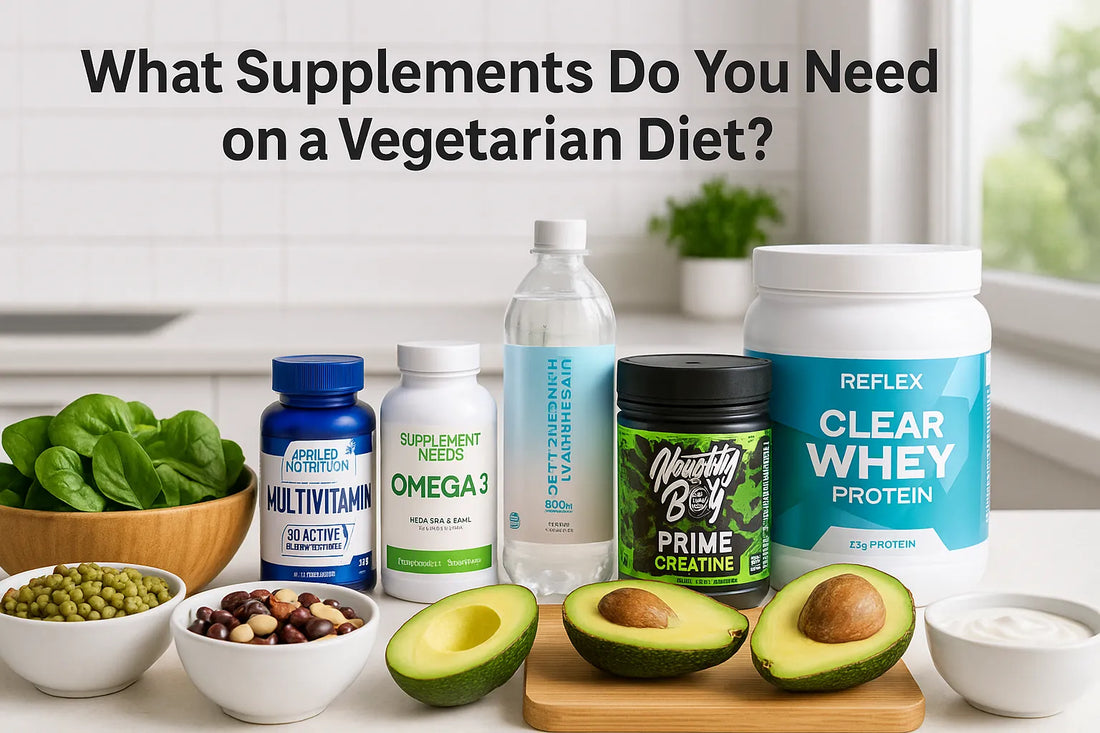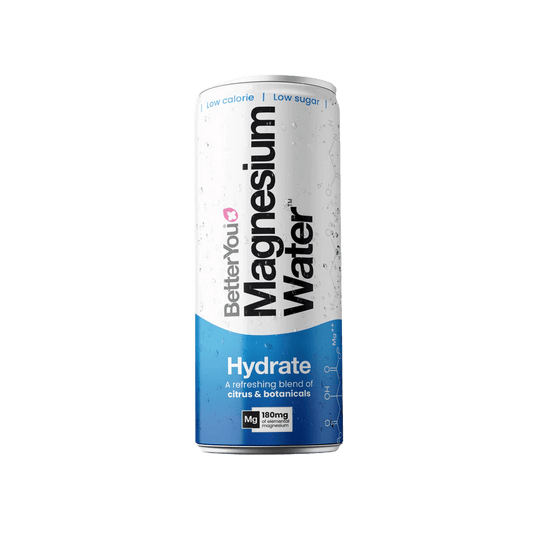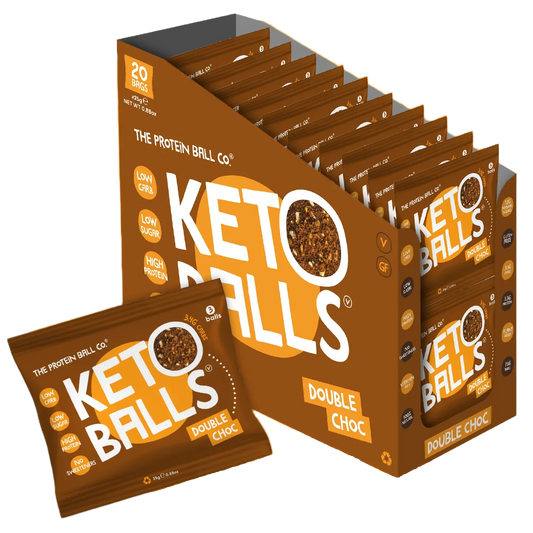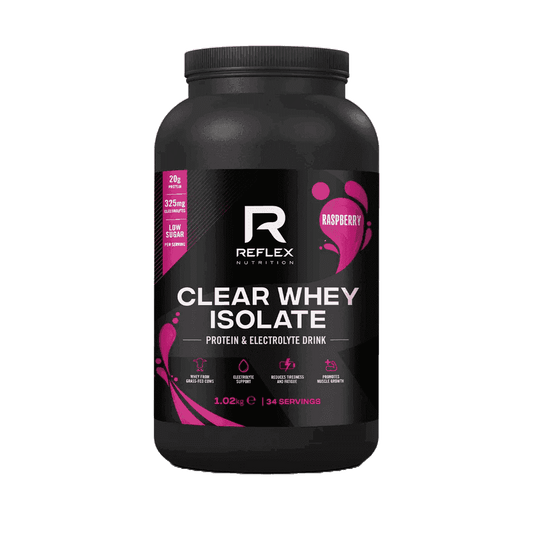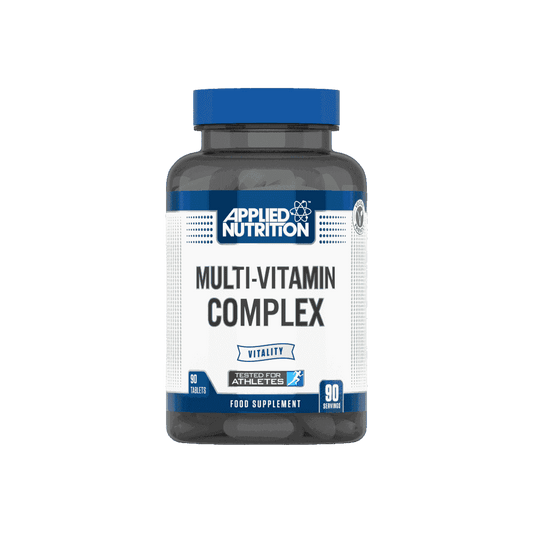Switching to a vegetarian diet is often seen as a step towards better health, more sustainable living, and in many cases, a performance-friendly lifestyle. After all, plant-forward diets are rich in fibre, antioxidants, and whole food nutrients. But there’s one big question people ask once they cut out meat: am I missing anything nutritionally?
The truth is, a vegetarian diet can provide almost everything you need—but there are still common nutrient gaps that can slow recovery, weaken energy levels, and hold back gym performance. That’s where supplements come in. They’re not about replacing food, but about filling the cracks in an otherwise solid foundation.
Let’s break down exactly which supplements matter most for vegetarians, why they’re important, and how they help you feel and perform your best.
What Supplements Should I Take When Vegetarian?
Most vegetarians won’t struggle with carbs or even protein if they plan their meals carefully. The issues usually come down to micronutrients—the vitamins and minerals more abundant in animal products than in plants.
The key supplements worth considering are:
-
Multivitamins (to cover B12, zinc, vitamin D)
-
Omega-3s (DHA/EPA are scarce in vegetarian diets)
-
Magnesium (many people are deficient, not just vegetarians)
-
Protein powders (for muscle maintenance and growth)
-
Creatine (levels are lower in vegetarians than in meat-eaters)
These five categories form the nutritional backbone of a vegetarian supplement stack.
What Vitamins Do Vegetarians Usually Lack?
While a vegetarian diet is nutrient-dense, it tends to lack consistency in some crucial areas. The most common deficiencies are:
-
Vitamin B12 → Found almost exclusively in animal products, B12 deficiency can lead to fatigue, brain fog, and even long-term nerve issues.
-
Vitamin D → Not really a “meat vs plant” issue—it’s just difficult to get enough from food at all. If you live in the UK, supplementation is a must.
-
Zinc → Present in legumes and seeds, but harder to absorb from plants. Low zinc = weaker immunity and slower recovery.
-
Iron → Vegetarians often get plenty, but plant-based iron (non-heme) is absorbed less efficiently than animal iron.
That’s why a broad-spectrum multivitamin, like Applied Nutrition Multivitamin, is such an easy win—it locks down the areas where vegetarians most commonly fall short.

Do Vegetarians Suffer from B12 Deficiency?
This is one of the most important questions—and the answer is yes, vegetarians are at higher risk of B12 deficiency. Unlike vegans, who cut out all animal products, vegetarians may still get some B12 from eggs and dairy. But it’s usually not enough to maintain optimal levels.
B12 is essential for:
-
Energy metabolism
-
Red blood cell production
-
Nervous system health
-
Mood and mental clarity
Even “mild” deficiency can leave you feeling constantly tired. Supplementation is often the most reliable way to ensure you’re topped up.
Should Vegetarians Take B12 or B-Complex?
It depends on your goals:
-
B12 alone is ideal if that’s the only nutrient you’re struggling with.
-
B-complex (which includes B1, B2, B6, B12, folate, and others) is a better choice if you want to optimise energy, metabolism, and stress resilience.
👉 The easiest route? Choose a multivitamin that already contains the right balance, like Applied Nutrition Multivitamin, so you’re not juggling multiple bottles.
Do I Need a Multivitamin as a Vegetarian?
Strictly speaking, you can hit every nutrient target on a vegetarian diet with perfect planning. But realistically? Life gets busy. Even the most committed vegetarians skip meals, rely on convenience foods, or miss certain food groups.
A daily multivitamin isn’t about covering for laziness—it’s about giving yourself a safety net. With one supplement, you’re addressing:
-
B12 (the most critical gap)
-
Zinc (harder to absorb from plants)
-
Vitamin D (near-universal deficiency in the UK)
-
Antioxidants (which fight oxidative stress from both training and everyday life)
That’s why Applied Nutrition Multivitamin is such a strong foundation for vegetarians. It makes sure you’re not just “getting by” on your diet, but actually thriving.
Transitioning into Part 2
In Part 1, we’ve covered the biggest vitamin concerns for vegetarians—B12, zinc, vitamin D—and why a multivitamin is often the smartest starting point.
But vitamins are only half the story. In Part 2, we’ll move on to:
-
Why omega-3 is often the missing link in vegetarian diets
-
How magnesium supports recovery and energy
-
The best ways for vegetarians to hit protein targets (including shakes and snacks)
-
Why creatine is especially important if you don’t eat meat
-
How to structure a complete supplement stack for strength, recovery, and wellbeing
What Supplements Do You Need on a Vegetarian Diet? (Part 2)
In Part 1, we covered the essential vitamins that vegetarians are most likely to miss—particularly B12, vitamin D, and zinc—and why a multivitamin is a simple but powerful safety net. Now it’s time to dig deeper into minerals, performance nutrients, and the supplements that turn a good vegetarian diet into a great one.

How Do You Get Omega-3 as a Vegetarian?
Omega-3 fatty acids are essential for brain health, heart function, joint mobility, and even reducing exercise-induced inflammation. The challenge for vegetarians is that the most efficient sources—like oily fish—are off the menu.
Plants like flaxseeds, chia seeds, and walnuts contain ALA (alpha-linolenic acid), but the conversion rate from ALA into DHA and EPA (the usable forms your body needs) is very low—sometimes less than 5%. That means even if you eat these foods daily, you’re unlikely to get enough DHA and EPA for optimal health.
That’s why Supplement Needs Omega 3 is a smart move. It ensures vegetarians can still benefit from the exact omega-3s the body uses for recovery, focus, and long-term health—without relying on fish.
Should Vegetarians Take Iron Supplements?
Iron is a nutrient vegetarians often think they’re deficient in—but it’s not always that simple. Lentils, beans, spinach, and fortified cereals provide plenty of non-heme iron. The catch? Non-heme iron isn’t absorbed as well as heme iron from meat.
The good news: vitamin C boosts iron absorption. That means pairing spinach or beans with a vitamin C source (like peppers or citrus) makes a big difference. A multivitamin with added vitamin C also helps here, making iron supplements less essential for many vegetarians unless a doctor confirms deficiency.
👉 Rule of thumb: Don’t supplement iron just because you’re vegetarian. Get tested, and only add it if you need it.
Are Vegetarians Low in Magnesium?
Magnesium is a mineral that supports over 300 processes in the body, from nerve signalling to energy metabolism to muscle recovery. While vegetarians technically get magnesium from nuts, seeds, legumes, and leafy greens, the demands of training and stress often outpace dietary intake.
Signs of low magnesium include:
-
Muscle cramps
-
Trouble sleeping
-
Low energy
-
Anxiety or irritability
That’s why BetterYou Magnesium Water is such a useful addition. It’s an easy, hydrating way to keep your magnesium topped up—especially handy for gym-goers who want their muscles and nervous system to recover properly between sessions.
What Is the Best Protein for Vegetarians?
Protein is the nutrient vegetarians are always asked about. While dairy and eggs help, it can still be tricky to hit muscle-building protein targets every day—especially if you’re aiming for 100g+.
This is where supplements shine:
-
Reflex Nutrition Clear Whey Protein → A refreshing, lighter option than traditional shakes, perfect for post-workout recovery.
-
The Protein Ball Co Keto Balls → On-the-go protein snack that supports daily intake without heavy meal prep.
Both are vegetarian-friendly ways to stay consistent. Rather than stressing about whether you’re hitting your macros, these products make it effortless.

Do Vegetarians Need Creatine?
Yes—probably more than meat-eaters. Creatine is naturally found in red meat and fish, so vegetarians start with lower baseline levels in their muscles. That translates to:
-
Lower explosive strength
-
Slower recovery
-
Less “pump” in the gym
-
Even potential cognitive disadvantages
Supplementing creatine levels the playing field. Naughty Boy Prime Creatine gives vegetarians the same edge meat-eaters get naturally—improved strength, power, recovery, and muscle fullness.
For any vegetarian serious about lifting, this is one of the most impactful supplements you can take.
How Can I Eat 100g of Protein a Day as a Vegetarian?
It’s not impossible, but it takes strategy. Here’s a sample breakdown:
-
Breakfast: Greek yogurt with nuts and chia seeds (~25g protein)
-
Snack: The Protein Ball Co Keto Balls (~10g protein)
-
Lunch: Lentil curry with quinoa (~25g protein)
-
Shake: Reflex Clear Whey Protein (~20g protein)
-
Dinner: Chickpea stir-fry with tofu (~25g protein)
That’s 105g protein—without meat, and without obsessing over every gram. Supplementation just makes it practical.
Is Being a Vegetarian Healthier Than Eating Meat?
This depends entirely on diet quality. A vegetarian who lives on chips, cheese, and white bread isn’t going to be healthier than a balanced omnivore. But a vegetarian diet built around fruits, vegetables, legumes, whole grains, and smart supplementation can absolutely support excellent health.
Supplements bridge the gaps, ensuring that going vegetarian doesn’t come at the cost of energy, performance, or long-term wellbeing.
Is There an All-in-One Supplement for Vegetarians?
There’s no single pill that covers absolutely everything, but you can build a mini-stack that ticks every box:
-
Applied Nutrition Multivitamin → B12, zinc, vitamin D, baseline cover
-
Supplement Needs Omega 3 → brain, heart, inflammation
-
BetterYou Magnesium Water → recovery, sleep, energy
-
Naughty Boy Prime Creatine → strength and cognitive performance
-
Reflex Clear Whey Protein + Protein Ball Co Keto Balls → easy protein targets
That’s your vegetarian “all-in-one.” It’s streamlined, sustainable, and covers every gap that could hold you back.
Conclusion: Thriving as a Vegetarian with the Right Supplements
Being vegetarian doesn’t mean settling for less—it means being smart about what you’re missing and filling those gaps. With the right supplements, you can support energy, recovery, and performance just as well (if not better) than meat-eaters.
Your core vegetarian supplement stack looks like this:
- Applied Nutrition Multivitamin
- Supplement Needs Omega 3
- BetterYou Magnesium Water
- Naughty Boy Prime Creatine
- Reflex Clear Whey Protein
- The Protein Ball Co Keto Balls
Add these to a balanced vegetarian diet, and you’re not just covering deficiencies—you’re setting yourself up to perform at your best every single day.
FAQ: Supplements for Vegetarians
1. Do vegetarians really need supplements?
Yes—especially for B12, omega-3, and vitamin D, which are hard to get from plant foods.
2. What’s the number one supplement for vegetarians?
Vitamin B12. Without it, fatigue and long-term nerve problems are common.
3. Should vegetarians take creatine?
Yes—creatine is absent from plant foods, and supplementation helps boost strength and recovery.
4. What’s the best protein for vegetarians?
Reflex Clear Whey Protein is ideal for recovery, while The Protein Ball Co Keto Balls are a convenient snack.
5. Do vegetarians need omega-3?
Yes—plant omega-3 (ALA) doesn’t convert well to DHA/EPA, so supplementation is important.
6. Is magnesium an issue for vegetarians?
It can be—BetterYou Magnesium Water makes it simple to top up and improve recovery.
7. Can vegetarians get enough iron?
Yes, but absorption is weaker from plants. Pairing iron-rich foods with vitamin C improves uptake.
8. Do vegetarians need a multivitamin?
Most benefit from one—Applied Nutrition Multivitamin is an easy solution.
9. Is being vegetarian healthier than eating meat?
It can be, if you plan carefully and supplement smartly.
10. What’s the simplest vegetarian supplement stack?
Multivitamin + omega-3 + magnesium + creatine + protein support.

